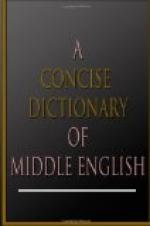The work, in fact, contains a very large collection of words, in many variant forms, appearing in English literature and in Glossaries between A.D. 1150 and A.D. 1580. The glossaries in S2, S3 (Specimens of English, 1298-1393, and 1394-1579) have furnished a considerable number of words belonging to the Scottish dialect, which most dictionaries (excepting of course that of Jamieson) omit.
The words are so arranged that even the beginner will, in general, easily find what he wants. We have included in one article, together with the Main Word, all the variant spellings of the glossaries, as well as the etymological information. We have also given in alphabetical order numerous cross-references to facilitate the finding of most of the variant forms, and to connect them with the Main Word. In this way, the arrangement is at once etymological and alphabetical—adapted to the needs of the student of the language and of the student of the literature.
The meanings of the words are given in modern English, directly after the Main Word. The variant forms, as given in their alphabetical position, are frequently also explained, thus saving (in such cases) the trouble of a cross-reference, if the meaning of the word is alone required.
An attempt is made in most cases to give the etymology, so far at least as to shew the immediate source of the Middle-English word. Especial pains have been taken with the words of French origin, which form so large a portion of the vocabulary of the Middle-English period. In many cases the AF (Anglo-French) forms are cited, from my list of English Words found in Anglo-French, as published for the Philological Society in 1882.
The student of English who wishes to trace back the history of a word still in use can, in general, find the Middle-English form in Skeat’s Etymological Dictionary, and will then be able to consult the present work in order to obtain further instances of its early use.
The relative share of the authors in the preparation of this work is easily explained. The whole of it in its present form (with the exception of the letter N) was compiled, prepared, and written out for press by Mr. Mayhew. The original plan was, however, my own; and I began by writing out the letter N (since augmented) by way of experiment and model. It will thus be seen that Mr. Mayhew’s share of the work has been incomparably the larger, involving all that is most laborious. On the other hand, I may claim that much of the labour was mine also, at a much earlier stage, as having originally compiled or revised the glossaries marked S2, S3, C2, C3, W, W2, P, and G, as well as the very full glossarial indexes cited as B, PP, and WA, and the dictionary cited as SkD. The important glossary marked S was, however, originally the work of Dr. Morris (since re-written by Mr. Mayhew), and may, in a sense, be said to be the back-bone of the whole, from its supplying a very large number of the most curious and important early forms.




